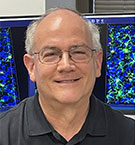
For the past 24 years, Scott Zeitlin has been at the University of Virginia in the Department of Neuroscience studying Huntington’s disease (HD) using a variety of mouse models he has developed and characterized in his laboratory.
He received his B.S. in Chemistry from Stanford University and then a Ph.D. in Human Genetics from Columbia University where he studied the mechanism of pre-mRNA splicing. While at Columbia, he met Nancy Wexler who convinced him to begin working on Huntington’s disease and together with his collaborators, he developed one of the first knockouts and conditional knockout of the mouse Huntingtin gene, along with the CAG140 knock-in HD mouse model.
At the University of Virginia, he has continued to develop and use a variety of HD mouse models to understand the function of the HD protein, Huntingtin, and to model HD pathogenesis. Recently he and his collaborators developed HD knock-in mouse models that express regulatable versions of the normal and mutant Huntingtin genes to better understand the mechanism of HD pathogenesis and to help determine when during pathogenesis Huntingtin lowering therapies should be administered.
In 2019, Dr. Zeitlin was the recipient of the Hereditary Disease Foundation’s Leslie Gehry Brenner Prize for Innovation in Science.
Support Our Work
Your contribution helps provide care and advance research for XDP patients, especially those who cannot access sufficient medical care and social resources.
